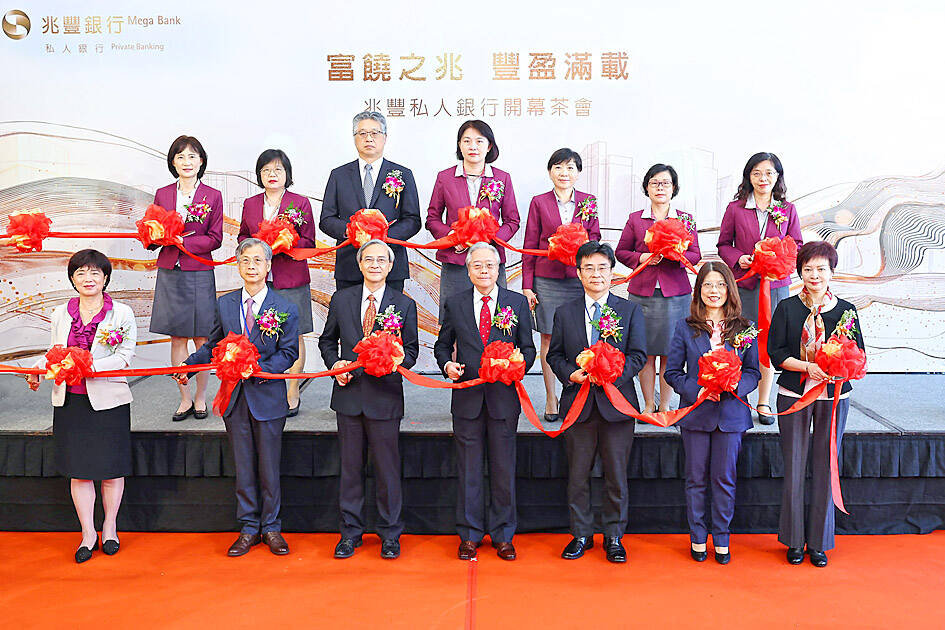State-run Mega International Commercial Bank (兆豐銀行) yesterday established a private banking unit aimed at high-net-worth clients, an arena that has gained importance, as lenders compete to grow their market share.
Lei Chung-dar (雷仲達), chairman of Mega International and its parent group Mega Financial Holding Co (兆豐金控), said he is serious about the private banking unit, which was created to meet the standards of foreign banking groups, especially peers in Singapore and Hong Kong.
Many first-generation business owners in Taiwan have accumulated sizable wealth after decades of hard work and have asset allocation, retirement planning and business succession needs, among other things, Lei said.

Photo courtesy of Mega International Commercial Bank
To meet the requirements of high-end clientele, the private banking sector has become a battleground for financial players, and Mega International would not be sitting out, he said.
The lender would seek to gain a better understanding of this group of people, and come up with solutions and services by learning from banks in Singapore and Hong Kong, as they tapped into this market a long time ago, Lei said.
The lender’s private banking division is a positive response to the Financial Supervisory Commission urging domestic banks to not stay on the sidelines, he said.
While high-net-worth individuals make up only 5 percent of the lender’s clients, their assets account for 20 percent of its assets, Mega International head of private banking Chen Chou-rong (陳昭蓉) said.
The private banking unit would also provide inheritance planning and wealth management services, she added.

Semiconductor business between Taiwan and the US is a “win-win” model for both sides given the high level of complementarity, the government said yesterday responding to tariff threats from US President Donald Trump. Home to the world’s largest contract chipmaker, Taiwan Semiconductor Manufacturing Co (TSMC, 台積電), Taiwan is a key link in the global technology supply chain for companies such as Apple Inc and Nvidia Corp. Trump said on Monday he plans to impose tariffs on imported chips, pharmaceuticals and steel in an effort to get the producers to make them in the US. “Taiwan and the US semiconductor and other technology industries

A start-up in Mexico is trying to help get a handle on one coastal city’s plastic waste problem by converting it into gasoline, diesel and other fuels. With less than 10 percent of the world’s plastics being recycled, Petgas’ idea is that rather than letting discarded plastic become waste, it can become productive again as fuel. Petgas developed a machine in the port city of Boca del Rio that uses pyrolysis, a thermodynamic process that heats plastics in the absence of oxygen, breaking it down to produce gasoline, diesel, kerosene, paraffin and coke. Petgas chief technology officer Carlos Parraguirre Diaz said that in

SMALL AND EFFICIENT: The Chinese AI app’s initial success has spurred worries in the US that its tech giants’ massive AI spending needs re-evaluation, a market strategist said Chinese artificial intelligence (AI) start-up DeepSeek’s (深度求索) eponymous AI assistant rocketed to the top of Apple Inc’s iPhone download charts, stirring doubts in Silicon Valley about the strength of the US’ technological dominance. The app’s underlying AI model is widely seen as competitive with OpenAI and Meta Platforms Inc’s latest. Its claim that it cost much less to train and develop triggered share moves across Asia’s supply chain. Chinese tech firms linked to DeepSeek, such as Iflytek Co (科大訊飛), surged yesterday, while chipmaking tool makers like Advantest Corp slumped on the potential threat to demand for Nvidia Corp’s AI accelerators. US stock

SUBSIDIES: The nominee for commerce secretary indicated the Trump administration wants to put its stamp on the plan, but not unravel it entirely US President Donald Trump’s pick to lead the agency in charge of a US$52 billion semiconductor subsidy program declined to give it unqualified support, raising questions about the disbursement of funds to companies like Intel Corp and Taiwan Semiconductor Manufacturing Co (台積電). “I can’t say that I can honor something I haven’t read,” Howard Lutnick, Trump’s nominee for commerce secretary, said of the binding CHIPS and Science Act awards in a confirmation hearing on Wednesday. “To the extent monies have been disbursed, I would commit to rigorously enforcing documents that have been signed by those companies to make sure we get